Over the years, Pipedrive CRM has earned a solid reputation as a go-to tool for deal tracking and sales pipeline management. And for many teams, it was exactly what they were looking for.
But, if you’re here as someone who has used Pipedrive, you probably know it is not the most all-encompassing choice when it comes to sales CRMs.
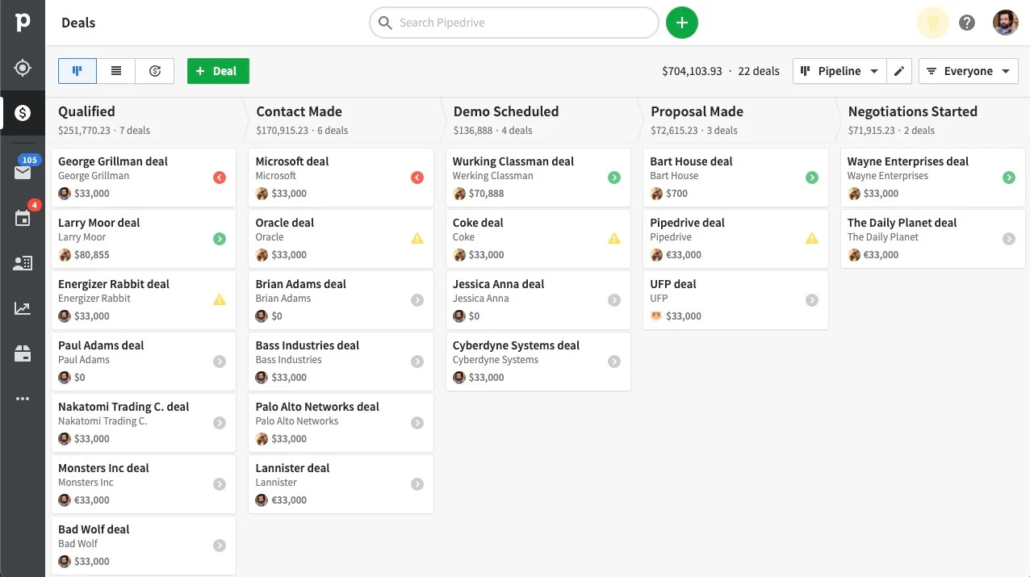
In fact, chances are you’re already aware of its limitations.
Maybe you need deeper automation or more customization. Perhaps your sales and marketing teams are stepping on each other’s toes due to a lack of funnel visibility or disconnected workflows. Whatever the case, there are several strong alternatives out there.
So, we’ve put together a list of the best Pipedrive alternatives in 2025. Whether you are new to the CRM world or if you’re rethinking your current setup, this is a good place to start.
8 Best Pipedrive Alternatives for 2025
| Pipedrive Alternatives | Popular for | Average Rating | Pricing |
| LeadSquared | Ease of use, Pricing, Scalability, and No-code Automation | 4.4 | Lite – $25 per user/month Pro – $50 per user/month Super – $100 per user/month |
| Less Annoying CRM | Fast, Affordability, Customer Support | 4.8 | 15$ per user/ month |
| ActiveCampaign | Ease of use, SMB – focused, Automation and workflow | 4.6 | Lite – $29 per user/month Plus – $49 per user/month Professional – $149 per user/month Enterprise – Custom pricing |
| Freshsales | Customer Support, Ease of use, Automation and Flexibility | 4.6 | Free – $0 per user/month Growth – $29 per user/month Pro – $69 per user/month Enterprise – $125 per user/month |
| EngageBay | Ease-of-use, Highly affordable, No-code workflows, and All-in-one CRM | 4.5 | Basic: $12.74/month Growth: $42.49/month Pro: $84.99/month |
| Monday CRM | Lead nurturing, User Interface, Scalability, and Interactability | 4.6 | Individual CRM – $0 per user/month Basic CRM – $10 per user/month Standard CRM – $14 per user/month Pro CRM – $24 per user/month Enterprise CRM – customizable |
| Salesmate | Robustness, Simplicity, and Customer Service | 4.6 | Starter – $12 per user/month Growth – $24 per user/month Boost – $40 per user/month Enterprise – Custom pricing |
| Agile CRM | SMB – focused, Functionality, and Customizability | 4.1 | Free – $0 per user/month Starter – $8.99 per user/month Regular – $29.99 per user/month Enterprise – $47.99 per user/month |
1. LeadSquared
LeadSquared is a powerful CRM designed for high-velocity sales teams that need more than just basic pipeline tracking. Unlike Pipedrive, which focuses heavily on sales deal management, LeadSquared brings together sales execution, marketing automation, service modules, and industry-specific workflows into one platform. It’s particularly well-suited for sectors like finance, healthcare, education, and any business with a large field sales team — where lead volume is high and processes need to scale fast.
It excels in:
- Lead management
- Sales automation
- Out-of-the-box integrations
- Reports and analytics
- Customer onboarding
LeadSquared pros:
- Includes features like lead scoring, landing page builders, built-in dialers, mobile CRM, and more.
- The platform comes with ready-made templates and automation tailored to verticals like edtech, healthcare, financial services, and more.
- LeadSquared bridges the gap between marketing automation and sales with tools for tracking, prioritization, and team collaboration.
- Easy to capture, score, and nurture leads through every stage of the funnel
One user remarked: “Many integrations are in-built, it has good analytics and reporting part for sales forecasts and supportive customer service.”
LeadSquared cons:
- The depth of features and customization can feel overwhelming to teams moving from simpler CRMs like Pipedrive.
- A few reviews mention small glitches, especially when pushing the platform hard — though rarely deal-breakers.
LeadSquared pricing
LeadSquared, being more feature-extensive, is slightly more expensive than Pipedrive. You can check out their pricing page or refer to the structure below.
- Lite – $25 per user/month
- Pro – $50 per user/month
- Super – $100 per user/month
2. Less Annoying CRM
Less Annoying CRM (LACRM) is adamantly built with small businesses in mind. It focuses on simplicity, fast onboarding, and affordability — without the clutter of unnecessary features. If you’re looking for a no-fuss alternative to Pipedrive, especially as a solopreneur or small team, this CRM is the way to go.
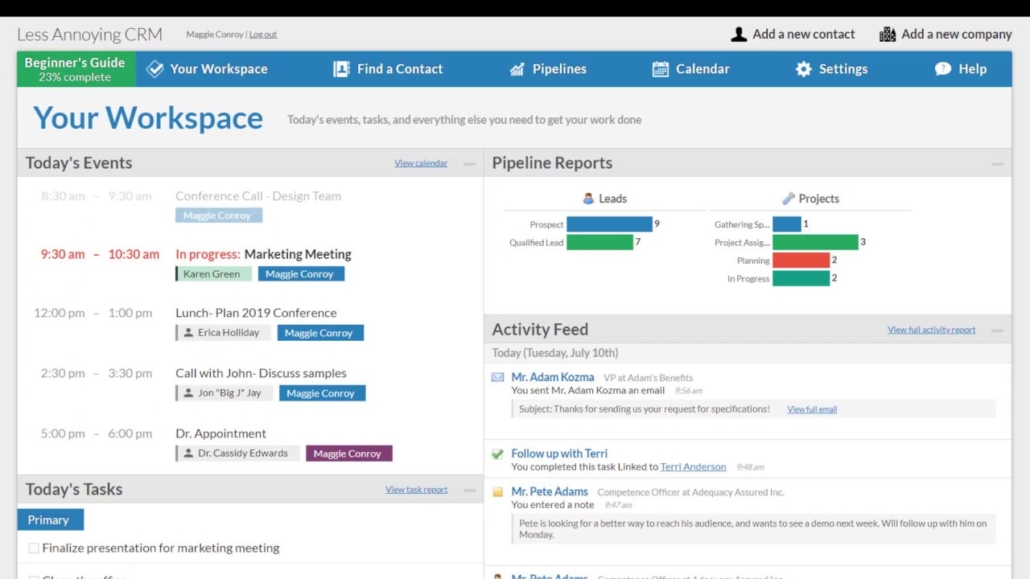
Less Annoying CRM pros:
- True to its name, LACRM is designed to be intuitive with minimal setup time. New users can get up and running in minutes — no learning curve.
- At $15/user/month, you get unlimited pipelines, contacts, storage, and reporting — no feature gating or upsells.
- Unlike Pipedrive’s report caps on lower-tier plans, LACRM offers unlimited reporting and simple customization across all plans.
- Users consistently praise the support team for being responsive, friendly, and helpful.
One user reviewed: It is “Simple and Pleasant” to use, with a shorter learning period than Pipedrive. LACRM also provides unlimited reports, when compared to the 15-report limit on Pipedrive’s primary package.
Less Annoying CRM cons:
- There’s no built-in email marketing or workflow automation, making it a limited choice for scaling operations.
- Native integration options are slim compared to Pipedrive.
- While it excels for startups or small teams, it’s not built for larger, complex sales structures.
Less Annoying CRM pricing:
- $15/user/month
- 30-day free trial available
3. ActiveCampaign
ActiveCampaign excels amongst small and medium businesses (SMBs). In fact, 90% of the CRMs income, according to the Gartner, comes from these small firms. It is simple to use, has a decent level of sales and marketing automation, and helps with email marketing campaigns.
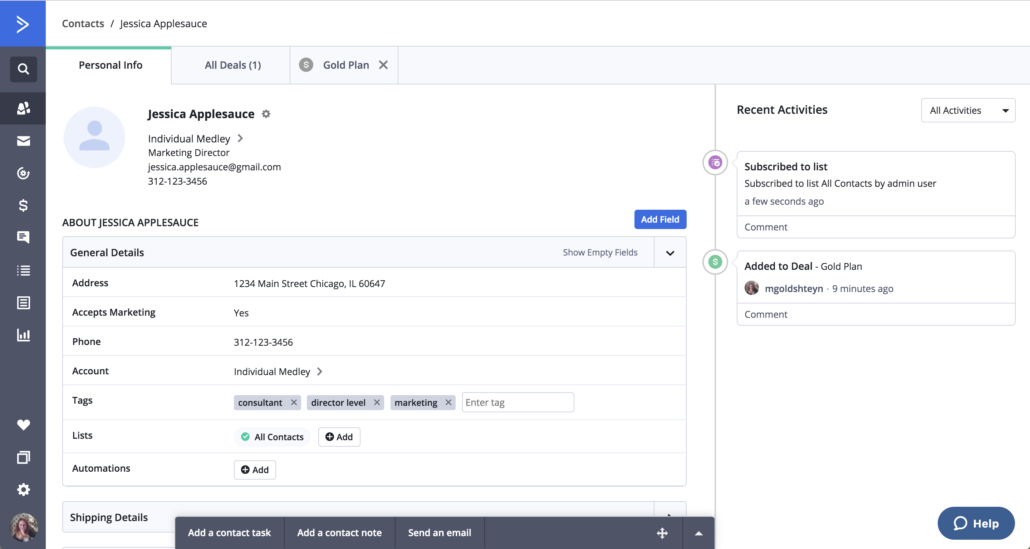
ActiveCampaign pros:
- You can visually map automations with 135+ triggers/actions, and create sales pipelines, follow-ups, and email campaigns effortlessly.
- Unlike Pipedrive, ActiveCampaign includes native lead scoring
- ActiveCampaign also lets you handle multiple sales pipeline—a big plus for multi-product or multi-service businesses.
One of the biggest advantages of this CRM is that it is easy to customize your automations and pipelines. As one user put it, it is “Simple, easy-to-use, and effective!”
ActiveCampaign cons:
- While automation is excellent, the CRM side lacks some depth compared to more sales-heavy platforms like Pipedrive.
- Though they offer free migration and training resources, multiple reviews cite long response times or inconsistent customer service.
- As your contact list and feature needs grow, costs can increase sharply.
While this CRM does provide unlimited reports at all its price points, it has been reviewed to be “painfully slow and not up to enterprise standards.”
ActiveCampaign pricing:
- Lite: $29/user/month
- Plus: $49/user/month
- Professional: $149/user/month
- Enterprise: Custom pricing
4. Freshsales
Freshsales CRM, part of the Freshworks suite, is a complete sales force automation system. It gives a salesperson everything they require to generate high-quality leads, engage in contextual discussions, close transactions using insights driven by AI, and develop long-lasting client connections.
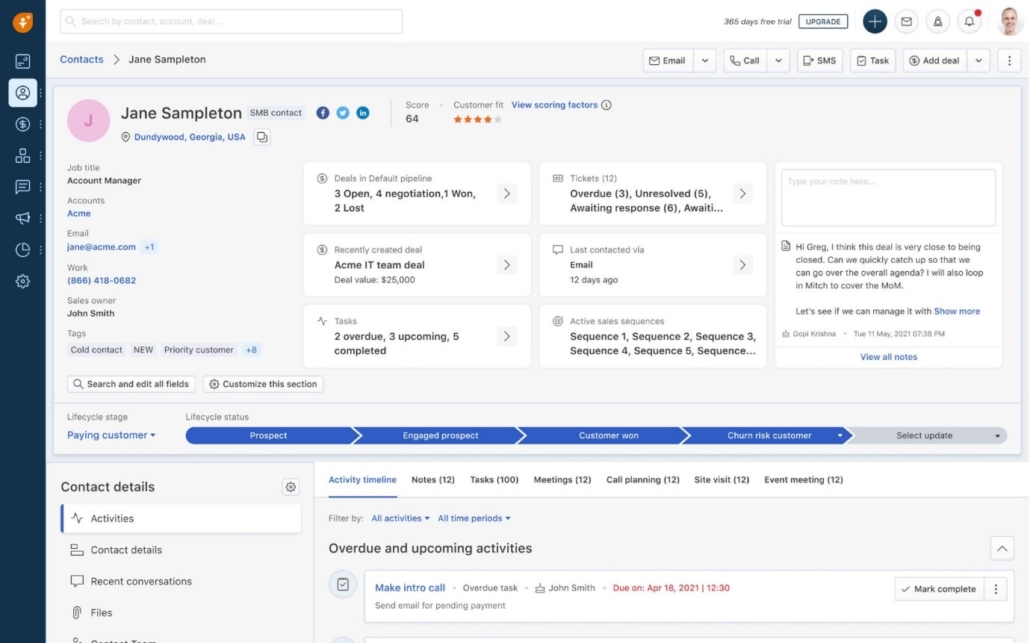
Freshsales pros
- Freshsales comes equipped with Freddy AI to help sales reps prioritize leads and close deals faster with contextual insights and smart follow-up suggestions.
- Sales teams can tailor stages, fields, and views to match their process, with drag-and-drop simplicity.
- The free plan and lower-tier pricing make it a great entry point for small businesses needing essential CRM tools.
According to reviews, another great thing about this CRM, is that it is “Affordable And Easy To Implement”.
Freshsales cons
- While the software is intuitive, support responsiveness isn’t always consistent.
- In-depth analytics and forecasting features are gated behind higher-priced plans.
Another fact is that while this CRM is certainly economical, it lacks some features which are present in Pipedrive. “Things I think should be basic (or I used in Pipedrive) just don’t exist or don’t work in Freshsales.” said one user.
Freshsales pricing
- Free – $0/user/month
- Growth – $29/user/month
- Pro – $69/user/month
- Enterprise – $125/user/month
5. EngageBay
For small businesses, expensive CRM software may be out of the question. This is where EngageBay comes in. EngageBay offers affordable all-in-one CRM software (marketing, sales, and customer support) designed specifically for SMBs and startups.
This versatile CRM software is heavy-laden with features, from omnichannel marketing, drag-and-drop landing page builder, multistep visual workflow tool, sales pipelines, helpdesk, live chat, and much more.
EngageBay also offers standalone plans for businesses that only need point solutions.
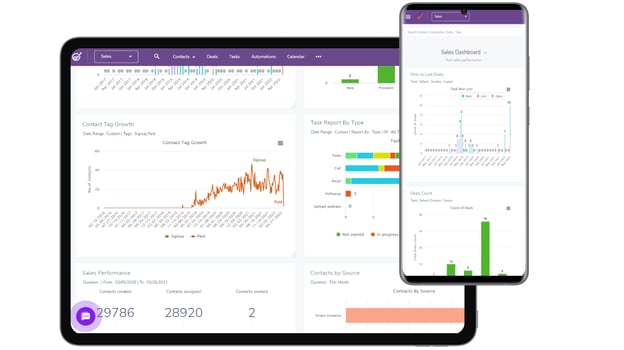
EngageBay CRM pros
- EngageBay combines marketing, sales, and service tools in one system—ideal for small teams that need a unified view of the customer journey without bouncing between apps.
- Drag-and-drop email builders, visual automations, live chat, appointment scheduling, and even proposal tracking come bundled at a cost much lower than most competitors.
- For businesses that don’t need the full suite, EngageBay offers separate sales, marketing, or support plans.
This five-star rated G2 testimonial summarizes the software as: “EngageBay is the perfect CRM for growing companies!”
EngageBay CRM cons
- While EngageBay supports some direct integrations (e.g. Shopify), its library is still growing and may feel limited compared to Pipedrive.
- Larger companies might outgrow its depth of features or reporting capabilities. Some users have also noted UX quirks and shallow analytics in lower-tier plans.
One user also expressed dissatisfaction with the speed of the system: “It lags a lot especially during bulk actions and there is a lag in campaign stats.”
EngageBay CRM pricing
- Free: $0/month (up to 250 contacts)
- Basic: $12.74/user/month
- Growth: $42.49/user/month
- Pro: $84.99/user/month
6. Monday Sales CRM
Built on top of Monday.com Work OS, Monday’s Sales CRM is a powerful sales solution that helps gather and nurture quality leads all the way through the fulfillment process. The platform helps track leads, centralize your customer database, and manage your sales pipeline for better sales efficiency. It’s ideal for teams who want full control over workflows and value flexibility in how they structure their customer journeys.
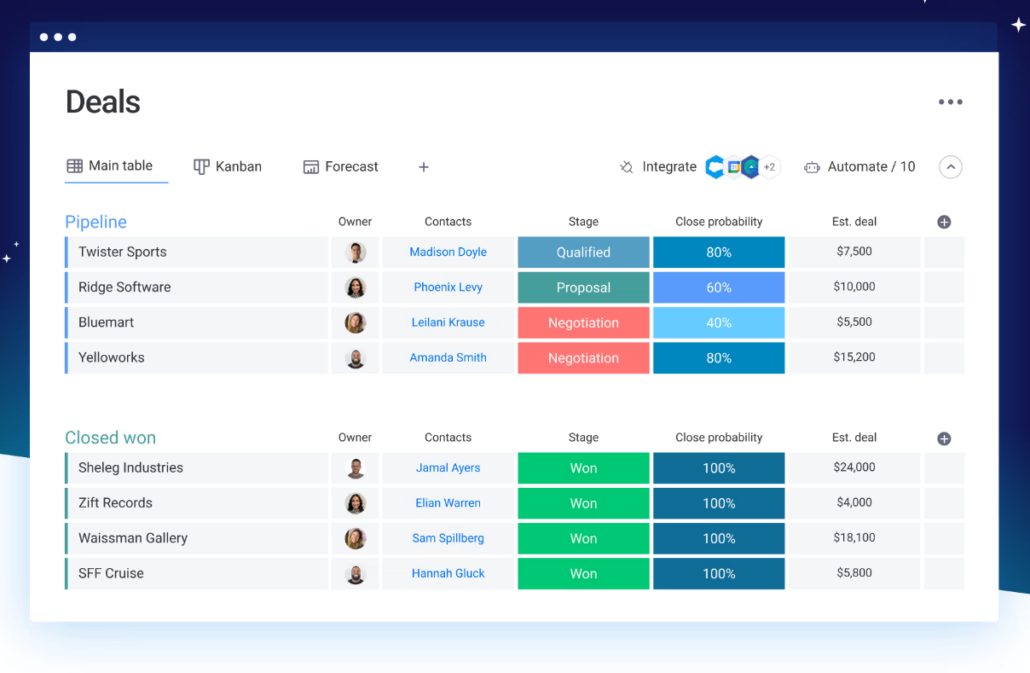
Monday Sales CRM pros
- You can tailor every part of your process with visual drag-and-drop tools that adapt to your company’s workflows
- It is easy to set-up no-code workflows, approval triggers, follow-up reminders, and more
- Connects to Google Ads, Slack, Zapier, Gmail, Facebook Lead Ads, and many others to centralize lead flow.
Another great thing about the CRM is that Monday’s architecture is scalable and adapts to business needs very well.
Monday Sales CRM cons
- Customization is powerful—but the depth can slow down implementation, and users often need training to get full value
- Requires a minimum of three paid seats, and each plan ships with usage thresholds—making small teams pay for extra seats they may not need
- Simple contact management is available early on, but advanced capabilities like email sync, forecasting, and analytics are gated behind higher-priced plans
Another drawback of this CRM is the lack of duplication checking. This might lead sales reps to call the lead twice or thrice. As a customer wrote on G2, the CRM was “Great in theory, but not so much in practice.”
Monday Sales CRM pricing
- Individual CRM: Free for up to 2 users (basic features)
- Basic CRM: $10/user/month (3-seat minimum)
- Standard CRM: $14/user/month
- Pro CRM: $24/user/month
- Enterprise: Custom pricing, includes advanced features
7. Salesmate
Salesmate is an up-and-coming CRM which helps you to deliver personalized experiences across marketing and sales. Its main focus is to replace disjointed systems to save your company time and money. The Sales CRM helps you organize, filter, and manage your leads into one place. It also offers live chat and call tracking features.
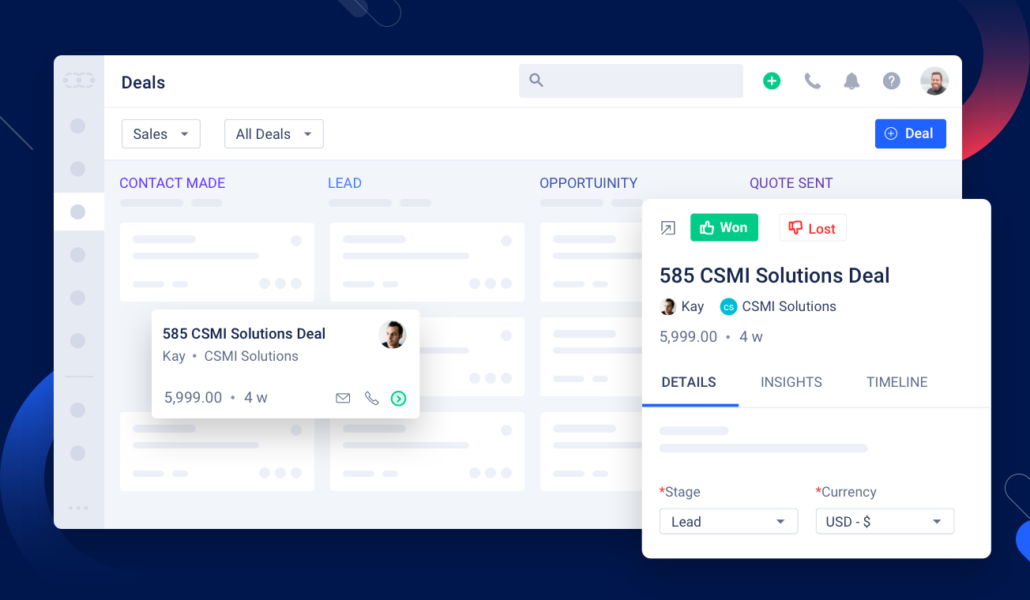
Salesmate CRM pros
- Salesmate is designed to be easy to use, fast to set up, and requires little to no training for teams to get started.
- Includes built-in calling, live chat, email sequences, SMS automation, and call tracking—no need to juggle multiple tools.
- Users consistently report that the platform is stable and free from major bugs or performance issues.
- Allows teams to tailor pipelines, sales sequences, and dashboards to match their internal processes without developer help.
Salesmate CRM cons
- Limited marketplace ecosystem: Fewer native integrations and third-party extensions compared to tools like HubSpot or Zoho.
- Not ideal for large enterprises: While powerful for SMBs, Salesmate may fall short for larger teams with complex CRM needs or global operations.
One reasons to reconsider before investing in this CRM is that it is still a very young and emerging company. This means that they haven’t gained enough experience or track record to know where their strengths and weaknesses lie. As a user put it, “This is a newcomer to the market, and we find that they’re working through a few hiccups.”
Salesmate CRM pricing
Salesmate offers four pricing tiers designed to scale with your business:
- Starter – $12 per user/month
- Growth – $24 per user/month
- Boost – $40 per user/month
- Enterprise – Custom pricing
8. Agile CRM
Agile CRM is a powerful but simple tool that focuses on sales and marketing automation. It offers contact and deal management, telephony services, project management, and reporting to help sales reps close deals faster. The platform supports up to 50,000 contacts even on the free plan—making it a compelling option for lean teams looking to maximize value.
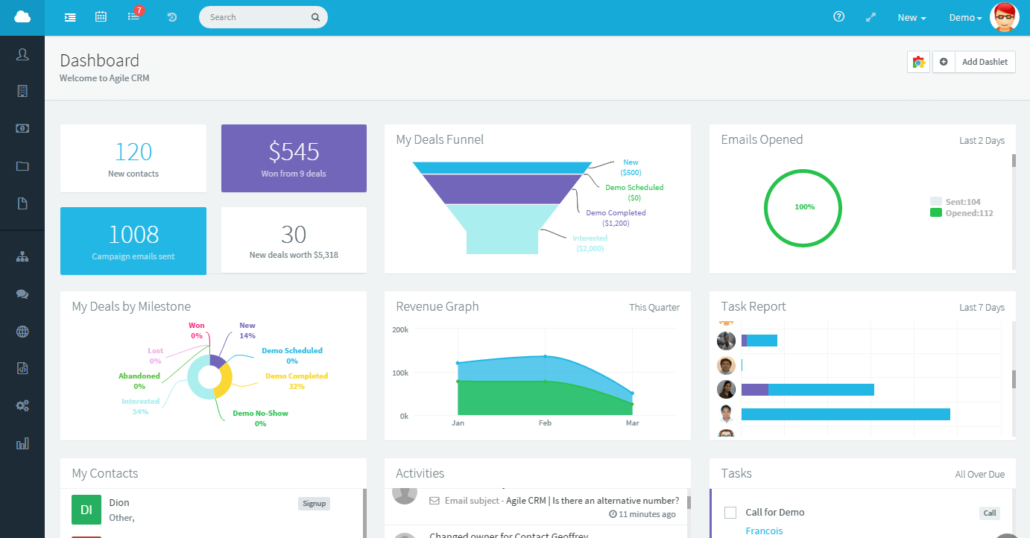
Agile CRM pros
- Agile CRM’s free plan supports up to 10 users and 50,000 contacts, offering significant value for small teams or startups.
- Combines contact and deal management, telephony, project tracking, email marketing, web engagement, and customer service tools.
- Visual drag-and-drop workflow builder for marketing and sales automation makes campaign setup intuitive and powerful.
One of the greatest strengths are the software’s analytics and reporting metrics which, as one user put it on G2, are “excellent and better than other competitors.”
Agile CRM cons
- The UI feels clunky and unintuitive compared to more modern CRMs.
- While perfect for small teams, Agile CRM may fall short for larger organizations with more complex needs.
Unlike Pipedrive, it also doesn’t provide pipeline management. This can prove to be a bad choice especially if your company’s main objective is to track and gain visibility through the various stages of sales journey. Lack of pipeline management also translates to inaccurate forecasts and being unable to track team efficiency.
Agile CRM pricing
- Free – $0 per user/month (up to 10 users and 50,000 contacts)
- Starter – $8.99 per user/month
- Regular – $29.99 per user/month
- Enterprise – $47.99 per user/month
Conclusion: Choosing the Right Pipedrive Alternative for Your Business
While Pipedrive continues to be a popular choice, it’s clear that today’s market offers a wide range of alternatives. Each of which comes with its own strengths in areas like automation, marketing integration, ease of use, or pricing flexibility.
If you’re looking for a CRM that goes beyond deal tracking and helps drive conversions at scale, LeadSquared is worth exploring. As we saw, it brings together sales execution, marketing automation, and lead management in one clean interface without overcomplicating things.
Want to see how it stacks up in action? Book a quick demo with our team.
FAQs
How do CRM platforms differ in AI capabilities?
While Pipedrive is known for its intuitive design, its AI capabilities are still relatively basic. In contrast, some other CRMs are now building smarter features right into the core platform—especially when it comes to automation, reporting, and lead management.
Many of these CRMs offer:
Real-time sales forecasting and analytics dashboards
Lead scoring powered by behavioral patterns and intent signals
Email sentiment analysis to help time your follow-ups
Automatic task assignments based on performance trends or lead status
Some platforms even provide AI tools on their lower-tier or free plans, giving small businesses access to predictive insights and smart automation without a steep cost.
For instance, certain CRMs—like LeadSquared—have begun integrating AI more meaningfully, with features like automated lead scoring, smart chat assistants, and task suggestions based on engagement history. While every platform approaches AI a bit differently, these additions can be incredibly helpful for sales teams looking to work smarter and close deals faster.
How does a Gmail-integrated CRM streamline lead, deal, and contact management?
A Gmail-integrated CRM simplifies your workflow by bringing key sales functions directly into your inbox. Instead of toggling between your email and a separate CRM system, you can manage leads, contacts, and deals without ever leaving Gmail.
Once connected, the CRM can automatically log emails, update contact details, and even track deal progress based on your email activity. You’ll often see a sidebar or dashboard inside Gmail that shows deal stages, tasks, or recent interactions—so you get a quick overview without leaving your inbox.
Many of these tools also include basic automation. For example, sending or receiving an email might trigger a task reminder, update a deal stage, or assign a follow-up to someone on your team. It’s a small change that can save a lot of time, especially for repetitive actions.
Because these CRMs often work with Google Workspace, your calendar, contacts, and tasks stay in sync too.
How does a Gmail-based CRM integrate with external data sources?
One of the key advantages of using a Gmail-based CRM is how smoothly it connects with other tools your team might already use—like ad platforms, spreadsheets, or form builders. This means you can automatically bring in leads and contact information from outside sources without jumping between tabs or copying data manually.
Let’s say you collect leads through Facebook ads or Google Forms. With the right setup, your CRM can automatically capture those submissions and turn them into contacts or deals—so your team can follow up right away. For example, a new form submission on your site could instantly create a lead in your CRM, complete with details pulled from a Google Sheet or Facebook Lead Ad form.
Your Gmail inbox plays a role, too. If you use labels in Gmail (like tagging certain messages as “New Lead”), the CRM can detect that and automatically update or create the right records. This kind of automation reduces the need for repetitive admin work, helps keep data accurate, and makes it easier to respond quickly to new leads.
What’s the learning curve like for a Gmail-integrated CRM?
Getting started with a Gmail-integrated CRM can take a bit of adjustment, especially if you’re coming from a more traditional, standalone CRM. Since everything happens inside your Gmail inbox—like updating contact info, tracking deals, or setting up automations—the layout and tools may feel unfamiliar at first.
If your team already works within Google Workspace, the transition is usually easier. Many of the features build directly on tools you’re already using. But for users who are used to working in external CRMs like Pipedrive, it may take a few days to learn where everything is and how to manage workflows directly from email.
That said, once people get used to the system, the benefits tend to outweigh the initial learning curve. Not having to switch between tabs or copy information back and forth can save time and help keep things more organized in the long run.
What key questions should I ask during a CRM demo?
During a CRM demo, focus on practical fit rather than surface-level features. Ask how well the CRM handles your team’s daily tasks, how it integrates with your current tools (like email or calendars), and how simple it is to automate workflows. Inquire about reporting capabilities, customization options, user support, and how pricing scales as your team grows. These questions help ensure you’re evaluating a system that aligns with both your processes and growth plans.
Should I choose a cloud-based CRM or an on-premise solution?
For most small and mid-sized companies, cloud-based CRMs are more practical. They’re quicker to set up, automatically updated, and accessible from anywhere—ideal for distributed teams. On-premise CRMs offer more control and visibility over data security, but require upfront investment in server infrastructure, and depend on internal IT staff for maintenance. Unless you have specific hosting or compliance needs, cloud-based solutions are usually more efficient and cost-effective.
Why are integrations important in a CRM?
Integrations connect your CRM with other tools—like email platforms, ad networks, customer support systems—so data flows automatically between apps. When your CRM syncs with these tools, it reduces manual work, ensures cleaner data, and allows reports to pull accurate information from multiple sources. This means your sales, marketing, and support teams can all work from a unified view of the customer without juggling different platforms.
How do I know if a CRM is right for a small sales team?
If you’re running a small sales team, focus on CRMs that are easy to set up, don’t require heavy training, and offer features like email tracking, lead scoring, and basic automation. You likely don’t need complex enterprise tools at this stage. Look for transparent pricing, responsive support, and integrations with the tools you already use—like Gmail, Slack, or Google Sheets. A free trial or freemium plan can also help you test usability before committing.
Can I use a CRM if my business mostly gets leads from Facebook or Instagram?
Yes, many CRMs today offer native or third-party integrations with Facebook Lead Ads and Instagram messaging. This means leads can automatically enter your CRM when someone submits a form or reaches out on social. From there, you can automate follow-ups, assign leads to the right rep, and track conversations in one place. Just make sure the CRM supports multichannel capture or connects to tools like Zapier or Make.com if direct integrations aren’t available.
What’s the difference between a sales CRM and an all-in-one CRM?
A sales CRM focuses strictly on the sales process: lead tracking, pipeline management, and closing deals. An all-in-one CRM adds marketing automation, customer support, and sometimes even billing or project management. The right choice depends on your team structure. If you’re only managing deals, a focused sales CRM may be less distracting. But if you want to align sales with email campaigns or customer success, an all-in-one might be more efficient long-term.
Is Gmail integration enough, or should I look for a CRM with its own email system?
That depends on your workflow. If your team already uses Gmail, choosing a CRM that works inside your inbox can save time and reduce tab-switching. You can track emails, update deal stages, and manage contacts directly within Gmail. However, some teams prefer a built-in email tool—especially if they need advanced features like automated drip campaigns, shared inboxes, or deeper campaign analytics. You might not need both, so weigh what your team actually uses.
Can a CRM help me follow up with cold leads automatically?
Yes, many CRMs offer automation features that let you set up follow-up sequences for cold or inactive leads. For example, you can create workflows that trigger reminder emails after a few days of no response, reassign cold leads to another rep, or even move them to a different pipeline. This reduces manual follow-up and helps revive leads that might otherwise go silent. Make sure the CRM supports conditional logic or basic automation flows to handle this.
Do I need a CRM if I already use Google Sheets to track my leads?
Google Sheets works for very small or temporary setups, but it quickly becomes limiting. CRMs bring structure, automation, and visibility that spreadsheets can’t. For instance, with a CRM, you can log communication history, track deal stages visually, assign tasks, and run reports without manually updating anything. Plus, many CRMs can sync with Google Sheets if you still want to use them for certain data views or exports.
What features make a CRM truly versatile?
A versatile CRM goes beyond basic contact and deal tracking. It helps connect multiple parts of your business in one place. For example, all-in-one platforms like LeadSquared combine tools for sales, marketing, and customer service, so teams don’t need to switch between different systems. Automation is another essential feature, allowing you to set up workflows for follow-ups, task assignments, or lead nurturing—saving time and keeping processes consistent.
Strong CRMs also support multichannel communication, letting you manage emails, SMS, web forms, or even social interactions from a single dashboard. Built-in reporting and AI features help track performance, highlight bottlenecks, and suggest where to focus next. Customizability matters too—being able to tailor pipelines, add custom fields, or integrate with your existing tools means the CRM can grow as your business does.
Smooth collaboration is key, so shared access to data across teams ensures handoffs don’t get lost in the shuffle. And finally, a user-friendly interface reduces the learning curve, helping everyone get up and running quickly without heavy training.








